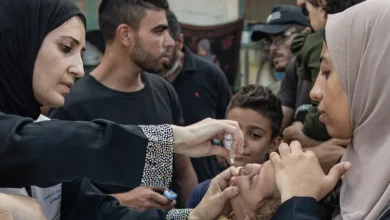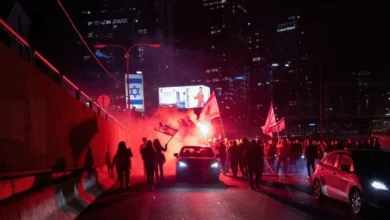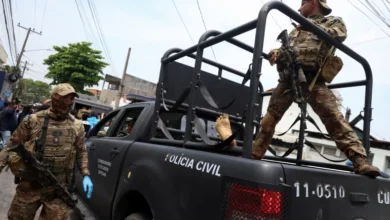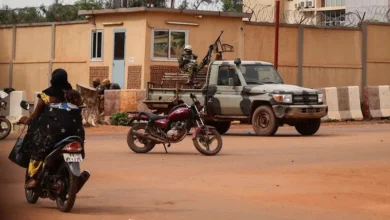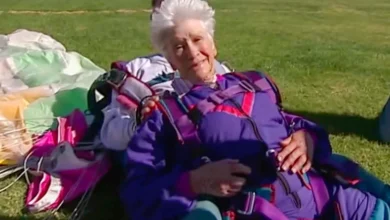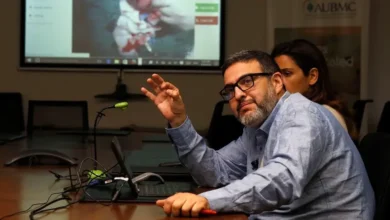Families want justice, ‘blood money’ for AU peacekeeper killings in Somalia
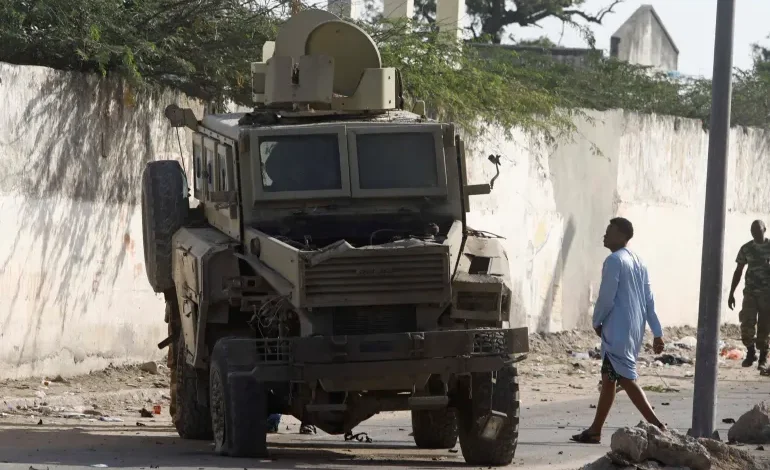
Omar Hassan Warsame was a larger-than-life figure in the Somali town of Golweyn, where his sizeable farm provided maize, bananas and jobs that helped sustain the community.
The 65-year-old and a contingent of up to a dozen of his employees would tend to crops on the plot in the Lower Shebelle region, some 110km (68 miles) southwest of the capital Mogadishu – which helped spare locals from the effects of the region’s recurring droughts.
On August 10, 2021, African Union (AU) peacekeepers from Uganda converged on the farm. Renowned as a community representative, it was not uncommon for businessmen or officials to approach Omar. But, for reasons that remain unclear, the soldiers opened fire on him and four of his employees.
“They killed them in cold blood,” Mohamed Abdi, a nephew of Omar’s, told Al Jazeera. “He was a community leader. A kind, charitable man who provided for the poor and cared for all his neighbours. The whole city mourned with us.”
Seven civilians were killed in the Golweyn massacre, which prompted outrage across Somalia. Demonstrators took to the streets in Mogadishu and towns in Lower Shebelle demanding the withdrawal of foreign peacekeepers from the country. Eventually, a Ugandan court martial sentenced two soldiers to death and three others to lengthy prison terms, before a Ugandan court threw out the death sentences.The peacekeepers belonged to the African Union Mission in Somalia, or AMISOM. They were first deployed in 2007 to prevent a takeover of the country by al-Qaeda affiliate al-Shabab, which seeks to overthrow Somalia’s government. While al-Shabab frequently engages in battles with peacekeepers and government forces, civilians have borne the brunt of its attacks. The armed group is estimated to have killed around 4,000 civilians in shootings, suicide bombings and other forms of violence between 2008 and 2020.
AMISOM peacekeepers – composed of troops from countries in the region – were primarily tasked with countering al-Shabab’s influence, providing security in government-held areas and coordinating with fledgling Somali security forces.
Backed by the United Nations, United States and other donor states, the AU peacekeepers have played a critical role in countering threats posed by the armed group.
But reports about their involvement in abuses against civilians can be traced back to their initial years in the country. Rebranded as ATMIS (African Union Transition Mission in Somalia) in 2022, and now planning an end-of-the-year withdrawal from the country, families of victims say the AU owes them justice and “blood money” – financial compensation for their suffering.
“They’re supposed to be peacekeepers, but they murder civilians,” Omar’s nephew Mohamed told Al Jazeera. “What makes them different from al-Shabab then?”
Compensation for victims
Since the overthrow of President Siad Barre in 1991, Somalia has been plagued by internal fighting between rival strongmen, with a weak central government. Following the rise of the Islamic Courts Union (ICU), a political and military entity established by local Islamic law courts to govern the country, troops from neighbouring Ethiopia entered Somalia and drove the ICU from power in late 2006. The splintering of the ICU and the presence of Ethiopian troops, widely unpopular among Somalis for war crimes committed during fighting, fomented resistance. Eventually, hardliner elements of the former ICU went on to establish al-Shabab.
International efforts to stabilise the country led to the establishment of the AU’s peacekeeping mandate in 2007. Ethiopian troops withdrew the bulk of their forces by early 2009 but always maintained a troop presence in Somalia, before merging them with the AMISOM force by 2014.
Somalia’s international partners have invested billions into upgrading the country’s security apparatus. The national army’s ability to independently take on al-Shabab has increased over time, and the once-looming threat of an al-Shabab takeover of the capital Mogadishu has diminished considerably.
But despite the nearly two-decade-long presence of African peacekeepers whose numbers have previously reached 20,000, swaths of the country remain under al-Shabab control, and government security forces struggle to expand their reach.
The group’s capacity to carry out deadly attacks on civilian and military targets has hardly waned. In August, a suicide bombing and gun attack targeted beachgoers at the popular Lido Beach in Mogadishu, killing at least 32 people.
With little in terms of concrete results on the ground, donor fatigue has led to cutbacks, including a reduction of $60m last year by the European Union. Funding shortages are reportedly among the reasons ATMIS plans to depart Somalia by the end of this year.
Despite the financial woes, the EU successfully delivered $200m in funds meant to compensate the families of the estimated 3,500 AU peacekeepers who have died in Somalia since 2007.But there is nothing earmarked for victims of peacekeeper violence, something ATMIS officials have tried to explain to the families.
“As such, the matter of compensation is being jointly dealt with by Addis Ababa and Mogadishu and a technical team that deals with judicial and compensation-related matters.”
Souef did not respond to follow-up questions on how a joint initiative between two governments whose bilateral ties are currently at their lowest in decades – over Ethiopia’s controversial plans to recognise the breakaway republic of Somaliland – was made possible.
Last year, Souef told Voice of America that ATMIS needed at least $2m from donors to cover compensation requests in almost 80 cases of peacekeeper violence against civilians. These cases include killings, as well as critical and minor injuries, but the AU has not specified how many of each.
Who can be held accountable?
On August 12, 2017, following a battle with al-Shabab in the city of Garbaharey, 450km (280 miles) west of Mogadishu, Abdullahi Osman Ige, 77, Ahmed Hussein Elmi, 71, and Abdullahi Ali Hussein, 19, were shot and killed by Ethiopian AMISOM troops, according to local police and media reports.
In the years that followed, local clan elders in Garbaharey repeatedly requested “blood money” payments from AMISOM/ATMIS for the families of the three.
“The concept of blood money payments is deeply entrenched in Somali society and has cultural and religious connotations,” explained Dalmar Gure, chief editor at prominent Somali news portal Hiiraan Online.
“Before centralised governments ruled Somalia, disputes over murder or grazing land for instance, could be solved with blood money payments. Governments have tried to stamp it out and direct disputes to formal courts. But with the fall of the government [in 1991] the practice made a resurgence.”
In March 2022, more than four years after the Garbaharey killings, the clan elders received a letter from AMISOM’s political head at the time, Mozambican diplomat Francisco Madeira. Madeira acknowledged the request for blood money payments, without accepting responsibility for the killings, and stated that the matter had been forwarded to AMISOM’s “strategic headquarters” in Addis Ababa for a final decision.
“That was the last time they responded to our letters,” Duale Ali, a local clan leader from Garbaharey, told Al Jazeera.
Duale said last October, following the expiry of Madeira’s mandate, he paid a visit to Souef, Madeira’s replacement, in Mogadishu.
“He is aware of the Garbaharey case,” Duale said. “But when I asked him about compensation, he said that this wasn’t ATMIS’s responsibility, but Ethiopia’s. He also said that ATMIS could offer development projects and employment contracts as compensation instead. As we are talking about human lives, this is insulting.”
With local Somali courts having no jurisdiction to try the peacekeepers, Duale has nowhere to turn.
Souef denied making these comments when reached by Al Jazeera. “I spoke outside of the topic of compensation, and notified them that in the context of their religious customs they could submit proposals for what is referred to as a ‘Quick Impact Project’ related to water, electricity or building schools that could benefit from funding by allied countries or the UN. There was never a question of using project contracts as compensation,” he said.
If Duale’s only avenue for compensation is through Ethiopia, the odds for any atonement are slim, according to one expert.
“Ethiopia has a terrible human rights situation and given its track record of addressing its domestic human rights violations, one cannot realistically expect it to deliver accountability or compensation in this case either,” said Goitom Gebreleul, a researcher and political analyst on the Horn of Africa. “Secondly, with the diplomatic fallout between the two countries, Ethiopia wouldn’t have any diplomatic incentive to deliver compensation for its victims in Somalia.”
Ethiopian Communications Minister Legesse Tulu did not respond to Al Jazeera’s calls or text requests for comment.
When asked if there were avenues for the AU or individual states to be held accountable under international law, Chidi Odinkalu, an international human rights law professor at Tufts University, explained that with immunity often agreed to by host countries, prosecuting international bodies like the AU is often impossible.
“There isn’t a universally observed mechanism for peacekeeping operations in place, but immunity is typically agreed upon, making prosecution unlikely,” he said, pointing to a suit filed by Haitian lawyers against UN Nepali peacekeepers and a suit against Dutch peacekeepers in the Balkans as examples.
